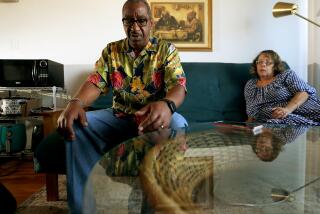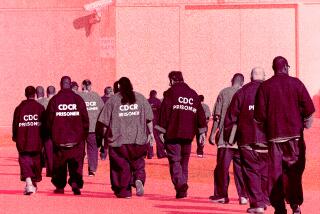AIDS Factor Vexes Parole Officials in Addict’s Case
- Share via
A Granada Hills drug addict who tested positive for the AIDS antibody and who was paroled from prison Friday poses a new problem for state prison officials--how to safely administer urinalysis for drugs during his parole, authorities say.
The urine test presents a problem to probation officers and other personnel who administer it because the AIDS virus, known to be transmitted through blood, has also been found in other body fluids.
Only two state inmates identified as having AIDS, or acquired immune deficiency syndrome, have ever been paroled, said Les Johnson, a spokesman for the California Department of Corrections. But, until now, the department had never been faced with the need to develop special procedures in handling drug tests for parolees who have AIDS or have tested positive for the AIDS antibody, he said.
A Condition of Parole
Drug testing is usually made a condition of parole for convicts with a history of drug abuse, said Robert Gore, also a department spokesman. Such testing is usually accomplished through a urinalysis, he said.
The unusual situation facing prison officials was highlighted Friday in San Fernando Superior Court in the case involving David Wayne Criswell of Granada Hills.
Criswell, a confirmed drug addict who has been tested positive for the AIDS antibody, was paroled after serving two years for receiving stolen property in 1983.
Criswell’s correctional counselor and other prison officials may decide that, based on his history of drug abuse, Criswell must submit to periodic urinalysis for drugs while on parole, Gore said.
But parole personnel are not prepared to handle such testing if it is ordered, a Department of Corrections staff member said. In a letter sent to the deputy district attorney handling Criswell’s parole, Michael Casados of the department recommended that Criswell simply be released to his family.
Criswell “has tested positive for AIDS, making drug monitoring via urinalysis a cumbersome procedure which parole and probation are ill-equipped to deal with at this point in time,” Casados wrote. Nevertheless, Judge Terry O’Rourke ordered that Criswell report to the parole board within 15 days.
Although Criswell, 30, has only tested positive for the AIDS antibody and does not actually have AIDS or exhibit any symptoms of the disease, fear of the malady has already been exhibited by law-enforcement officials who have had to come into contact with him.
For example, at the request of the bailiff who escorted Criswell into court, Criswell was required to wear a mask over his nose and mouth while at the courthouse.
State prison officials are already examining the special problems of having inmates with AIDS in the state prison population, Gore said.
“Due to the slow and steady growth of AIDS inmates, the program for handling them is under continual review,” Gore said.
Vacaville Ward
Three months ago, the Vacaville state prison, where all state inmates with AIDS or who have tested positive for AIDS are sent, opened a hospital ward to house such inmates, Gore said. Before that, AIDS inmates were simply kept in isolation in areas of the prison, he said.
But Gore said he is not aware of any specific departmental proposal for handling drug testing for parolees who have AIDS or who have tested positive to the AIDS antibody.
California is far behind other states in the number of inmates with AIDS, Gore said. In the Vacaville facility, there are 37 such inmates, said Joe McGrath, a spokesman for the Vacaville prison. By contrast, New York State has 200 to 300 inmates with AIDS, Gore said.
More to Read
Sign up for Essential California
The most important California stories and recommendations in your inbox every morning.
You may occasionally receive promotional content from the Los Angeles Times.










